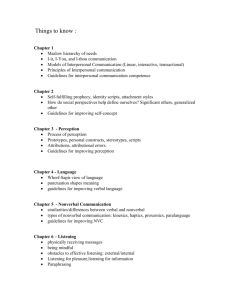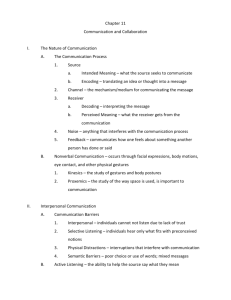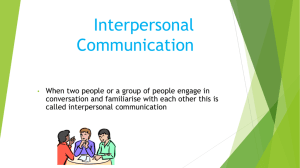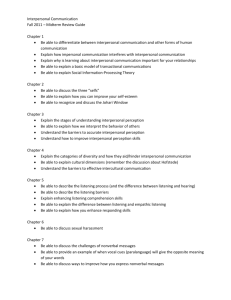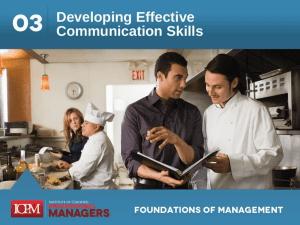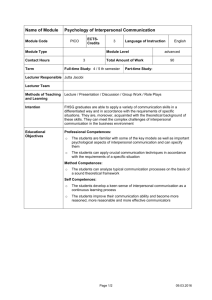People-Oriented Listening
advertisement
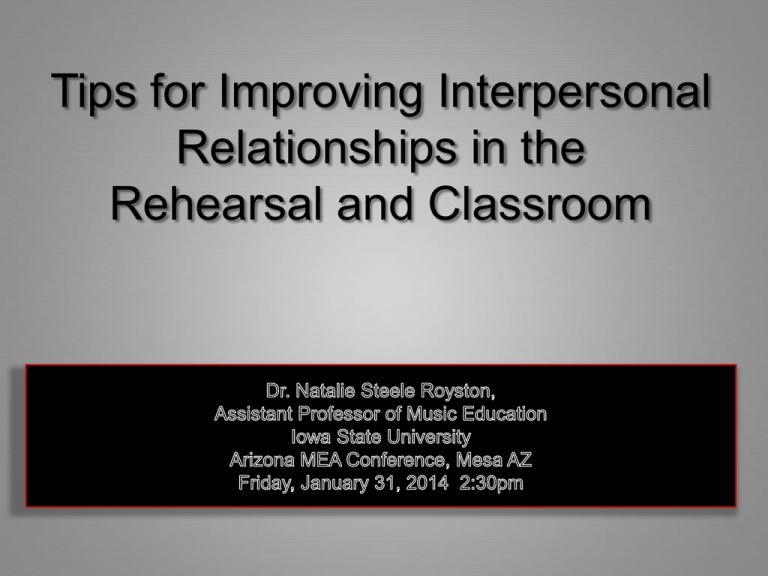
Tips for Improving Interpersonal Relationships in the Rehearsal and Classroom Who was your favorite teacher? What made him/her special? Skills of Successful Music Teachers Content Knowledge & Skills Pedagogical Knowledge & Skills Interpersonal Skills Why are interpersonal relationships important in the music classroom? “I have come to a frightening conclusion. I am the decisive element in the classroom. It is my personal approach that creates the climate. It is my daily mood that makes the weather. As a teacher I possess tremendous power to make a child’s life miserable or joyous. I can be a tool of torture or an instrument of inspiration. I can humiliate or humor, hurt, or heal. In all situations it is my response that decides whether a crisis will be escalated, and a child humanized or de-humanized.” ~Haim Ginott What does research say? Teachers participate in as many as 1000 interpersonal interactions every day! People can trace their successes and failures in their lives to their most significant relationships. (Maxwell, 2007, p 211) Strong positive relationships with teachers have been shown to positively affect students’ self- efficacy, motivation, behavior, and achievement. (Ryan & Grolnick, 1986) Students who perceived their teachers as caring exhibited greater social abilities, ability to attain goals, and higher achievement. Students want teachers to care for them both as learners and as people. (Wentzel, 2003) Students attributed increased motivation to interpersonal relationships; personal attention from adults in school, support for student input, support for diverse learning styles. Personal attention included demonstrations of interest in students’ personal lives (Cohen, 2006, p212) According to psychologist, Carl Rogers: Learning rests not upon teaching skills of the instructor but upon his/her ability to engage and create a relationship with the students. TIP #1: Know & Be Yourself Be a real person – don’t present a front or façade Be self-aware – know your own personality traits, communication style, listening style & emotional triggers Be aware of how others see you Communication Styles Passive communication involves the inability or unwillingness to express thoughts and feelings Aggressive style of communication involves overreaction, blaming and criticizing Passive-aggressive is a combination of the first two styles - they avoid confrontations (passive), but will be manipulative to get what they want (aggressive) Assertive Assertive people will say what they think and stand up for their beliefs without hurting others. Assertiveness means taking the initiative or first steps to deal with a problem in a constructive, self-protective manner, including standing up for oneself. Assertive people attack the problem, not the person; while aggressive people attack the other person rather than the problem. This is an effective style for teachers. How do we communicate? Time percentage 9% 45% 16% Writing Reading Speaking Listening 30% Listening Styles Action-Oriented Listening Prefers information to be wellorganized, brief, and error free (“get to the point”) Time-Oriented Listening Likes the message very brief, keenly aware of time (“drive by listener”) Content–Oriented Listening More comfortable listening to complex, detailed information (judges & lawyers) People-Oriented Listening Comfortable with and skilled at listening and recognizing people’s feelings and emotions TIP #2: Know Your Students (and Colleagues) •Learn & use names •See students as people, not instruments •Ask others’ opinions •Learn about your students and colleagues TIP #3: Be Aware of Perceptions – Yours and Others! Do you believe what you see or see what you believe? Self-fulfilling prophesy? Perceptions Process of experiencing your world and making sense out of what you experience Interpersonal perceptions Process by which you decide what people are like and give meaning to their actions Problem with Perceptions – Are your deceiving you? TIP #4: Keep Your Emotions in TIP #5: Be Understanding and Empathetic! Try to see the world through the student’s eyes Remember that every student is an individual with feelings, opinions, experiences, and potential Try not to criticize & judge Become “other” oriented! TIP #6: Improve Communication and Listening Skills Verbal Communication Non-verbal Communication •Eye Contact •Word Choice •Facial Expression •Be positive •Body Posture •Think before you speak •Vocal Cues •Converse, don’t compete •Proximity •Hand Gestures Listening Skills •Active vs passive listening •Pay attention •Be patient •Let the other finish •Provide feedback when appropriate Proximity changes how we relate TIP #7: Trust and Respect Others “I have to trust them to do their job, so I can do mine.” ~Vince Lombardi “Trust happens when someone else believes in him and is willing to trust him” ~Ralph Waldo Emerson TIP #8: Care!!! “Students don’t care how much you know until they know how much you care!!” ~unknown “…music is made by human beings. A love of community and care for each singer is paramount to any music-making activity.” ~James Jordan What do the students want from their teachers? •The teacher should trust the students •The teacher should have a sense of humor •The teacher should be friendly •Teacher should be enthusiastic about the subject •The teacher should take personal interest in the students •The teacher should have high standards •The teacher should be someone the students feel they can depend on •The teacher should be willing to listen to students’ ideas What the students don’t want from their teachers •The teacher should not get angry often in class •The teacher should not be manipulative •The teacher should not be impatient •The teacher should not intimidate or scare students •The teacher should not allow students to goof off in class •The teacher should not be sarcastic or tease the students •The teacher should not have “favorites” Interpersonal relationships are reciprocal and constantly evolving Students and teachers both contribute to the interpersonal relationships in the rehearsal and classroom. Teachers have the power to influence them for good or for bad. However, it is important to remember this… You can only change yourself and your actions, others will change as a result of your behavior and example. You cannot change someone else! “Throughout a lifetime, people are in contact with thousands of people in varying forms of relationship. Most have a very limited impact on us. But a few relationships have such a tremendous impact that they changed they course of our lives.” ~John Maxwell “Interpersonal relationships are important because people count – the way we interact with others is key to releasing human potential! Only teachers acting like people in their relationships with their students can even begin to make a dent in the problems in education.” ~Carl Rogers Dr. Natalie Steele Royston Asst. Professor of Music Education Iowa State University 207 Music Hall Ames, IA 50011 (515)294-6829 nasteele@iastate.edu http://nataliesteeleroyston.weebly.com

